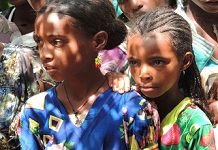Two UN agencies (UNICEF and UNFPA) advised the Government of Ethiopia to invest more in fighting child marriage and female Gentile Mutilation (FGM).
The call was made by in connection with the observance of the International Day of Zero Tolerance against Female Genital Mutilation (FGM) today under the theme, “Accelerating Investment to End Female Genital Mutilation.”
The two agencies call for an increased investment of resources by the Government of Ethiopia and development partners to accelerate implementation of the National Costed Roadmap to End Child Marriage and Female Genital Mutilation amid a prolonged COVID-19 pandemic and humanitarian crisis.
Ethiopia has made remarkable progress in the last decade in the reduction of FGM prevalence among girls and women aged 15-49 from 74 per cent in 2005 to 65 per cent in 2016. However, Ethiopia is still a home to 25 million circumcised women and girls.
This accounts for the largest absolute number in Eastern and Southern Africa and makes up 12.5 per cent of the 200 million women and girls who have undergone FGM globally. The prevalence of FGM among adolescent girls aged 15 to 19 has dropped from 62 per cent in 2005 to 47 per cent in 2016, according to the press statement from UNICEF Ethiopia Office.
Overall, 6️⃣5️⃣ percent of girls and women aged 15 to 49 have undergone female genital mutilation in #Ethiopia. @UNICEF and @UNFPAEthiopia are committed to eliminate the practice by 2030.
Find out how: https://t.co/B7R85Dyayi#EndFGM ✋🚫 pic.twitter.com/oypChCsJRV
— UNICEF Ethiopia (@UNICEFEthiopia) February 6, 2022
The National Costed Roadmap, which aims to end FGM by 2025, has an objective of sparing an estimated 3.6 million girls who are at the risk of undergoing FGM. The Government of Ethiopia is leading in costing and domestic financing the initiative pledging a 10 per cent annual budget increment in funding its National Costed Roadmap for FGM and child marriage. This is critical in decreasing dependence on external funding and assuring sustainability.
“We congratulate the Government for their efforts to end FGM by 2025 but we must collectively renew our commitment to ending this harmful practice and work with all stakeholders to change attitudes so that the next generation of girls can live healthier lives,” said Gianfranco Rotigliano, UNICEF Ethiopia Representative.
On her part, Ms. Esperance Fundira, UNFPA Officer-in-Charge noted, “FGM is not only a vicious practice rooted in gender inequality, but it inhibits girls and women from unleashing their potential. We must reiterate our full support for the accelerated implementation of the National Costed Roadmap to End Child Marriage and Female Genital Mutilation to end this harmful practice.”
Marking progress, saving more girls
Attitudes towards this harmful practice are shifting with more than 7 in 10 girls and women opposing the continuation of the practice. In 2021, UNFPA and UNICEF alone have reached 203,695 in and out of school adolescent girls through a transformative life skills training and Sexual and Reproductive Health education, to advocate norm change in their communities.
At community level, there is high commitment to end FGM and child marriage practices using community resources with 60 per cent of community members in the programme target regions declaring their readiness to abandon both practices.
The winding road ahead
The COVID-19 pandemic and the prolonged conflicts in Ethiopia in recent years have threatened the gains made in reducing the prevalence and indeed ending FGM since community mobilization activities including community conversations have been restricted.
Thus, adoption of innovative strategies such as the use of face masks, personal hygiene, social distancing, and reducing the number of participants in community outreach activities and others were critical in addressing the challenge. The declaration of state of emergency at the federal and regional levels also resulted in prioritization of peace and security over social transformation programs such as ending FGM.
UNFPA and UNICEF call for a strong stand to ensure the implementation of the roadmap to protect women and girls across Ethiopia from all harmful practices, including FGM and enable them to reach their full potential in health, education and income.
Also, both agencies appreciate donors’ commitment and financial contribution to the UNFPA-UNICEF Joint Program on the Elimination of Female Genital Mutilation: Accelerating Change in Ethiopia since 2008 as well as noting the specific contribution by the Global Affairs Canada as from 2020.
UNICEF is the UN agency engaged in promoting the rights and wellbeing of every child across the world.
UNFPA is United Nations Population Fund working in 190 countries focusing special effort on reaching the most vulnerable and excluded children, to the benefit of all children, everywhere.
In #2021, @UNFPAEthiopia reached more than:
🟠62,000 women & girls w/ life-saving midwifery interventions
🟠2,500 health staff w/ capacity-building sessions
🟠34 🏥 w/ medical suppliesWomen & Girls – at the 🧡 of our #NorthernEthiopia response!
More: https://t.co/IHmARwqr8R pic.twitter.com/yg8orLpyRt
— UNFPA Ethiopia (@UNFPAEthiopia) February 2, 2022

